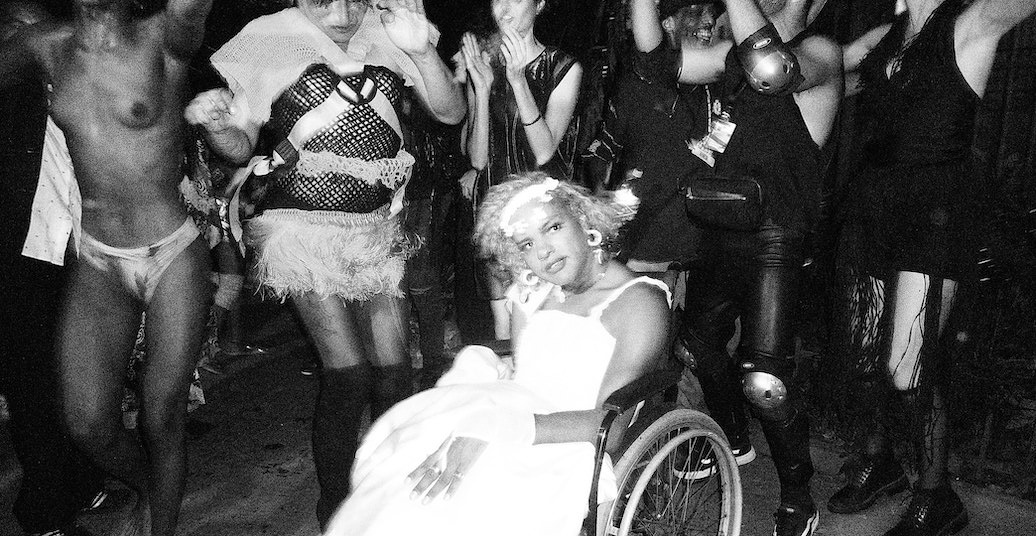In Pumpitopera Transatlantica created and performed by Mexa and showing at HAU2 on 19 and 20 May 2023 as the initial stop of the collective’s first international tour, absences and gaps in understanding are not mistakes. They are the lifeblood of a performance that rewrites the future without losing sight of the material reality of past and present.
“She’s not blind, you just can’t see her sometimes.”
In fact, we didn’t see Anita until about halfway through the show, when she was lifted into her wheelchair by the rest of the performers and hailed as Tiresias. Now the evening is almost over and she takes center stage. She’s wearing puffy folds of silver. She shakes her hair loose. Her arms swirl upwards as if buoyed by the heat of flame. She is the blind prophet. She is a phoenix. She is the president of Mexa, the collective that created and performs this show. She dances. The other performers dance around her. She dances, the room throbs with light and sound, she dances towards the lights, she dances out of her wheelchair, she dances floorward and skyward at once, she dances.
“I think we feel things in languages we don’t understand.”
Dourado, who doesn’t speak French, speaks these words in Brazilian Portuguese (surtitled) and then proceeds to sing a song in French (not surtitled) that indeed swells with feeling. Missing translations and missing surtitles mirror the jokes whose punchlines I miss because I don’t understand Portuguese, the references I miss because of their specificity to communities and cultures to which I don’t belong. Missing performers are honored and conjured on the stage. Podeserdesligado (soundtrack and sound design), who is onstage throughout the performance at the sound board, interjects regularly with absent ensemble member Bárbara Britto’s parts: if Bárbara were here, now she would say…
Mexa is a São Paulo-based collective of mothers, Black, trans and LGBTIQ* artists, theatre practitioners, and activists, founded in 2015 after outbreaks of violence in so-called homeless shelters. I am struck by the way the collective deals with what’s missing as something that is not to be hidden or fixed. It is not a mistake. It’s the result of untranslatability, or illness, or state violence, or family demands, or other priorities: life, in other words. As I watch Pumpitopera Transatlantica, their first international tour, I can feel unambiguously that performance is alive for Mexa as each of its members are alive, which is to say not just that it’s moving through the present but that it is also changeable, evolving. How will they square their work with the demands of European producing houses for repeatability, predictability, translatability? “We never managed to put a play on in the same way more than once,” they tell us in the first act. But this is no deficiency on their part. Rather, by pointing it out, by finding their own solutions to it, by performing one of the most compelling and alive evenings of live performance I have experienced in a long time, they reveal how much institutions of all kinds can require us to shed in order to fit into them. Including life itself.
“Tonight is definitely not a drag show. It’s a Greek tragedy.”
Pumpitopera plays with the very building blocks of such colonial social institutions, taking The Odyssey as its material—the source of tropes, types, and narratives that structure contemporary reality because they’re so ubiquitous. The hero’s journey story structure repeats in one blockbuster film after another. But we learn that for the Tupinambá, for example, the word “odyssey” doesn’t exist; you would speak of “the long path.” Aivan, as the narrator Ivana, opens the evening by negating all of the central tropes of Greek tragedy. You won’t see these here tonight. Or just a few. “There are always impossible tasks,” she says. And bloody eyes: hers, in fact, as another performer who is absent from the stage, in her case narrating the performance via prerecorded video; in realtime she’s in a hospital undergoing cataract surgery.
Why ODYSSEY, actually? Because it’s the story of ODYSSEus. And so throughout the night we get the TATIANEY, the DANIELEY, the DOURADOEY. Each Mexa collective member read their assigned chapter of The Odyssey and picked out a character for themselves. Patrícia decided to be Medusa, although she’s not in the text. Dourado couldn’t find themselves at all in the text, and chose Odysseus, Dourado’s opposite. Together the performer-creators (Aivan, Alê Tradução, Anita Silvia, Bárbara Britto, Daniela Pinheiro, Dourado, Patrícia Borges, Tatiane Dell Campobello) playfully appropriate and deconstruct and queer the epic. They take tales of colonial conquest and make them do headstands, like when Dourado (a mesmerizing performer and singer) raps “I’m on the colonizer’s continent / Are you proud of me, Mom?” The audience cheers.
A Jesuit brother in the seventeenth century described weaving catechization with Indigenous cultural practices in Brazilian aldeamentos, missionary-founded settlements that concentrated Indigenous peoples from different nations in order to “civilize” and de-Indigenize them: “Because [the Tupi] love musical things, we, by playing and singing among them, will win them.” A few centuries later Mexa wins its audience on the colonizer’s continent by playing among us with the full force of the knowledge that such “civilizing” was always in fact a process of transculturation. The last act of the night is Taty’s performance of the Lord’s Prayer (a tool that during the first year of Jesuit presence in Brazil was already being adapted “to ‘their way of singing’ so that the Indian boys would learn it faster and enjoy it more”). None of the western gods are safe tonight. We can rewrite the future. It’s us who discovered you. The final provocations interweave with Taty’s prayer. What if there was never a god who didn’t have our face?
Pumpitopera Transatlantica created and performed by Mexa premiered at HAU2 on 19/20 May 2023. Next performances at Kunstenfestivaldesarts in Brussels from 24-26 May 2023.




